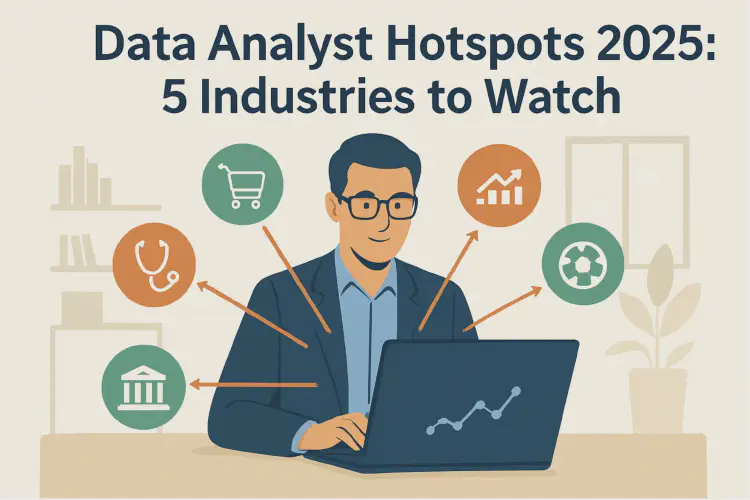Top 5 Industries Hiring Data Analysts in 2025 (And Why)
Discover the five industries where demand for data analysts is growing fastest in 2025 and why these sectors are opening doors to beginners.
- | 4 min read

Data is everywhere, and the ability to turn raw numbers into actionable insights has never been more valuable. If you are aspiring to a career as a data analyst, knowing where demand is growing can be as important as mastering Python, SQL, or Excel. In 2025, certain industries are showing particularly strong hiring trends, offering exciting opportunities for beginners to break into the field. Here’s a look at the top five.
1. Healthcare: Improving Patient Outcomes and Operational Efficiency
Healthcare organizations are drowning in data, from patient records and lab results to appointment scheduling and insurance claims. Hospitals, clinics, and health tech startups need data analysts to:
- Identify patterns in patient care.
- Optimize resource allocation and staffing.
- Analyze treatment outcomes for better decision-making.
Beginner roles: Junior data analyst, healthcare data coordinator, or clinical data assistant. These positions often focus on cleaning and visualizing data, providing a solid foundation before moving into predictive modeling or advanced analytics.
Why it’s growing: The shift toward personalized medicine, remote monitoring, and electronic health records is creating an ongoing demand for professionals who can interpret complex healthcare data.
2. E-Commerce: Driving Sales Through Insights
Online retail is booming, and e-commerce platforms collect enormous amounts of customer behavior data. Companies want analysts who can:
- Track purchasing trends and product performance.
- Optimize marketing campaigns through A/B testing and segmentation.
- Forecast demand to reduce inventory costs.
Beginner roles: E-commerce data analyst, marketing analyst, or sales data assistant. Many entry-level roles focus on dashboards, reporting, and analyzing website or app metrics.
Why it’s growing: The rapid expansion of online shopping and digital marketing means businesses must leverage data to stay competitive, creating a steady need for analytical talent.
3. Finance: Risk Management and Strategy
Financial institutions rely heavily on data to guide investment decisions, manage risk, and detect fraud. Analysts in finance are tasked with:
- Monitoring transaction trends and anomalies.
- Building simple predictive models for credit scoring or market forecasting.
- Reporting insights to inform business strategy.
Beginner roles: Junior financial analyst, data reporting associate, or even fraud detection assistant. Many of these positions emphasize data cleaning, reporting, and basic modeling before progressing to more complex predictive analytics.
Why it’s growing: Regulations, fintech innovations, and the increasing use of AI in trading are driving finance firms to hire more data-savvy professionals.
4. Sports: Optimizing Performance and Fan Engagement
The sports industry is no longer just about athletic talent, it’s about data-driven performance. Teams, leagues, and sports tech companies need analysts to:
- Track player statistics and training metrics.
- Analyze game strategies and opponent patterns.
- Enhance fan engagement through data-informed marketing.
Beginner roles: Sports data analyst, performance data assistant, or analytics intern. These positions often involve collecting and cleaning data, maintaining databases, and producing reports for coaches or marketing teams.
Why it’s growing: The rise of wearable tech, performance tracking software, and digital fan experiences is creating new entry-level opportunities that blend analytics with real-world impact.
5. Government: Policy, Planning, and Public Services
Governments at all levels are leveraging data to improve public services and policy decisions. Analysts in this sector work on:
- Monitoring public health trends and infrastructure usage.
- Evaluating the effectiveness of programs and initiatives.
- Creating reports that support policy decisions and budget allocations.
Beginner roles: Policy data analyst, junior public data analyst, or administrative analytics assistant. Entry-level analysts typically focus on data collection, validation, and basic reporting.
Why it’s growing: Governments are increasingly turning to data for transparency, efficiency, and planning, especially in areas like urban development, healthcare, and environmental monitoring.
Learn Data Analysis, Build a Portfolio, and Land an Internship at Linero Tech
At Linero Tech, our Data Analyst programme is designed for beginners with no prior coding experience. We teach you everything you need to break into the job market, including:
- Python and Pandas for data processing
- SQL for querying databases
- Visualization with Python using Matplotlib and Plotly
You’ll work on real projects using real datasets, and graduate with a strong portfolio of work. Also, you will receive career support and interview prep to help you land your first job as a data analyst; whether that’s in healthcare, e-commerce, public sector, or a local startup.
Ready to become a data analyst; even if you’ve never written a line of code?
👉 Discover our tech training programs
👉 See student reviews and success stories
